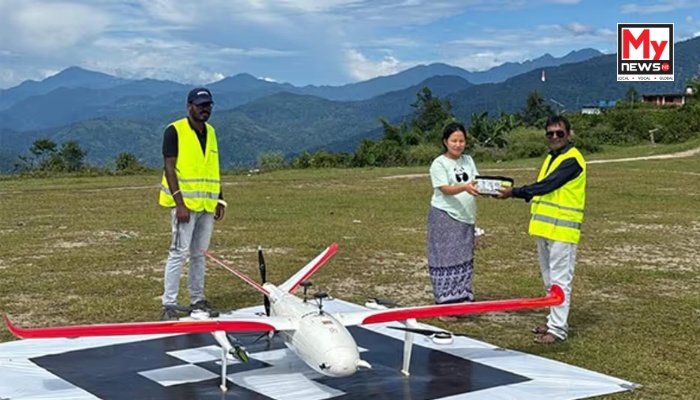Drones Deliver Hope: Arunachal Pradesh Embraces Aerial Healthcare Revolution
Itanagar: In a groundbreaking move, Arunachal Pradesh’s East Kameng district has successfully deployed drone technology for the transportation of Hepatitis vaccines from the District Hospital in Seppa to the Primary Health Centre in Bameng, marking a significant leap forward in healthcare accessibility. This pioneering initiative, part of the “Drone-Based Doorstep Diagnostic Service Project,” is set to transform last-mile healthcare delivery in the region’s remote and challenging terrains.
The use of drones for medical logistics promises not only reduced delivery times but also ensures timely immunisation, thereby strengthening the overall healthcare infrastructure in the area. This strategic adoption of innovative technology is a major step towards bridging critical healthcare gaps in Arunachal Pradesh, bringing essential medical supplies closer to those who need them most.
This local success mirrors a broader national push towards technologically empowered and self-reliant healthcare. Earlier, the Indian Council of Medical Research (ICMR), aligning with Prime Minister Narendra Modi’s vision, launched a pioneering study on the aerial transport of human corneas and amniotic membrane grafts. In collaboration with AIIMS New Delhi and Dr. Shroff’s Charity Eye Hospital, and with crucial support from the Ministry of Civil Aviation, ICMR conducted a feasibility study to assess the potential of drones in transporting sensitive ophthalmic biomaterials.
The study, conducted in Sonipat and Jhajjar, Haryana, saw a drone successfully transport corneal tissue from Dr. Shroff’s Charity Eye Hospital (Sonipat Centre) to the National Cancer Institute (NCI), AIIMS Jhajjar, and subsequently to AIIMS New Delhi. This journey, which typically takes 2-2.5 hours by road, was completed in a mere 40 minutes via drone, with optimal conditions maintained for specimen integrity. The transported cornea was successfully evaluated and led to a successful transplant surgery, highlighting the immense potential of drones as game-changers in healthcare logistics.
The timely transportation of corneal tissues is paramount, given the time-sensitive viability of donated corneas, where delays can compromise tissue quality and reduce transplantation success rates. Drone-based transport offers a swift, temperature-stable, and highly efficient alternative to often slow and unpredictable traditional road networks, particularly in semi-urban or rural areas. This innovative approach is expected to significantly bridge the gap between donor sites and recipients, ensuring that no viable tissue goes unused and more patients regain their sight in time, fostering a new era of rapid and reliable medical supply delivery across the nation.
Read More: Nagaland: Major Boost to Nagaland’s Healthcare Access

